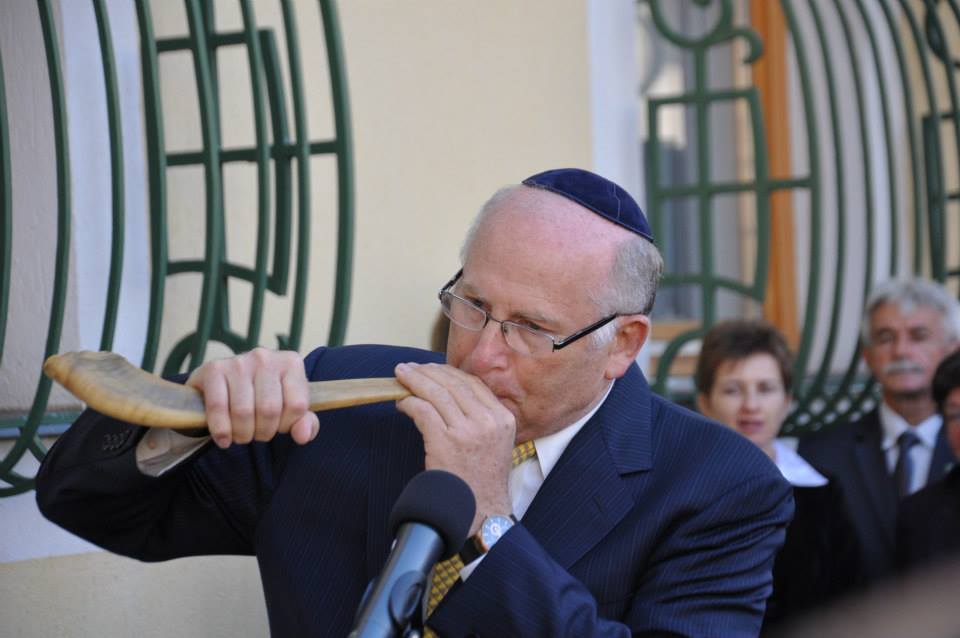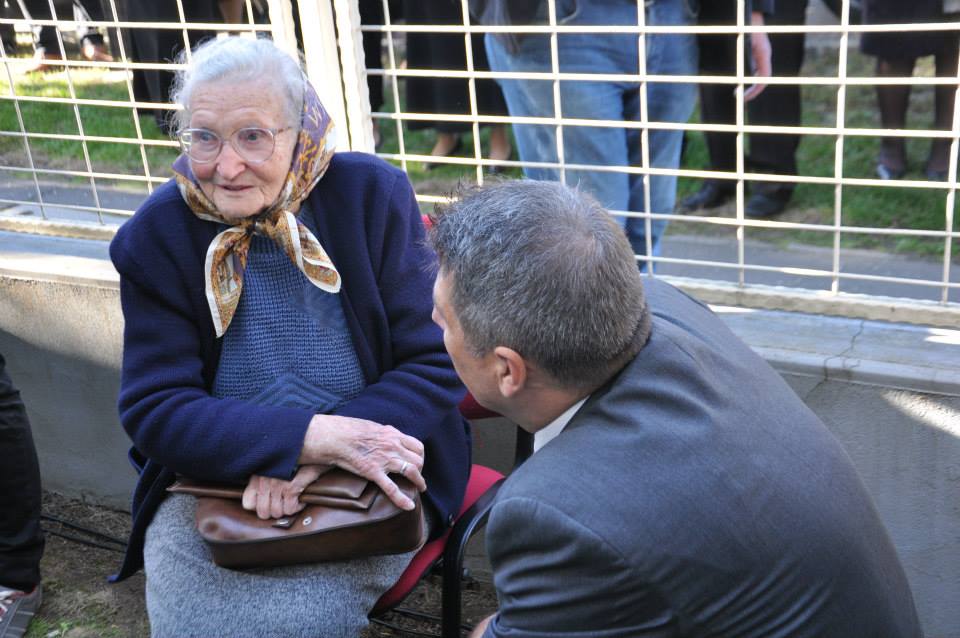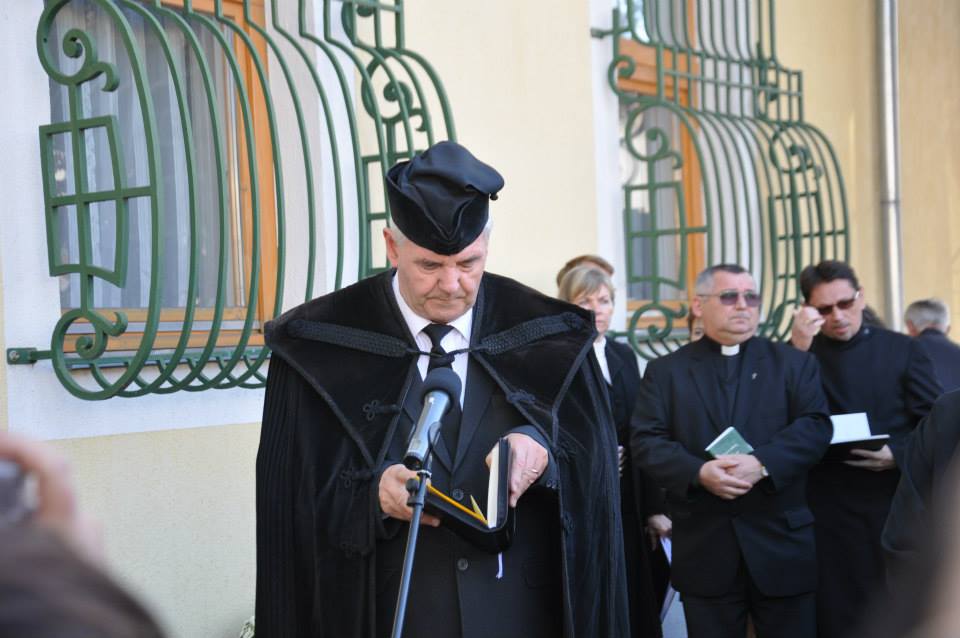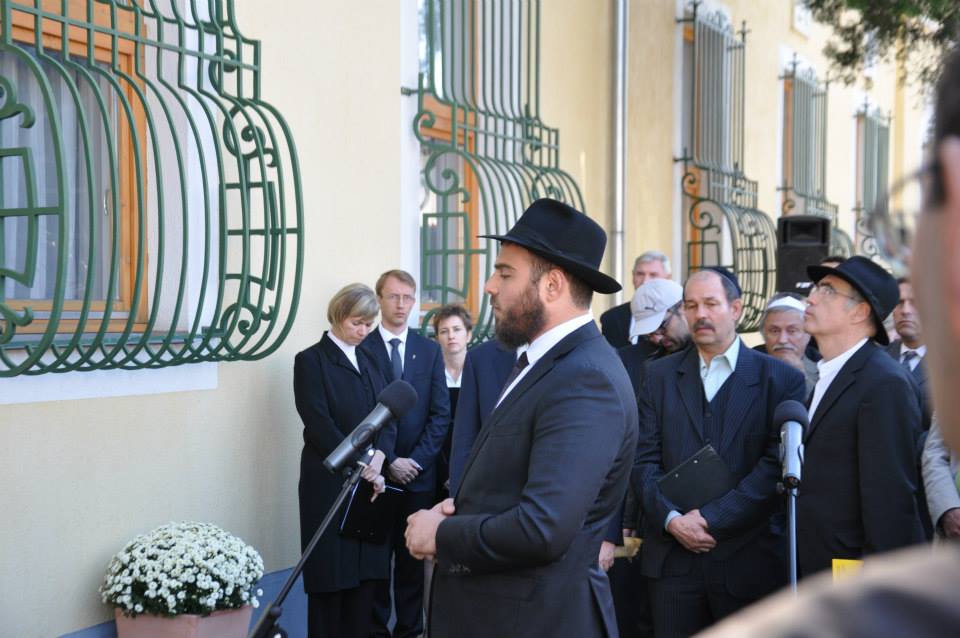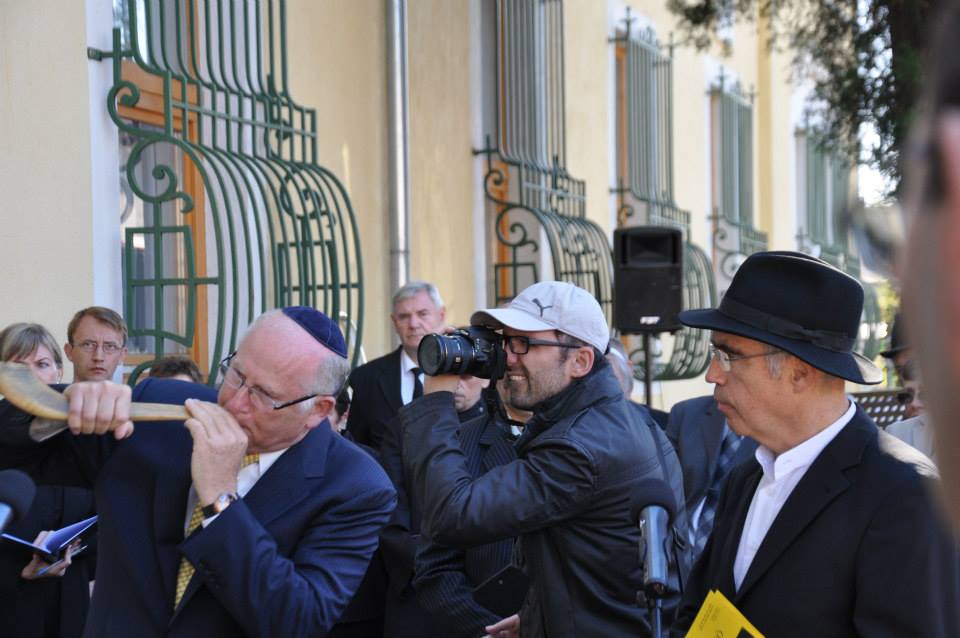Kétezer zsidóból mára egy maradt
A nyírbátori zsidókra emlékeztek – hetven év múltán először
„A felejtés száműzetés, az emlékezés szabadulás” – idézték a Bál Sém Tov szavait a Nyírbátori Holokauszt emléktábla avató ünnepségen, több mint féléves előkészület után, 2014. szeptember 28-án.
Az esemény megálmodói, kezdeményezői és (nagyobb részt) megvalósítói Fohn György és Dr. Grünstein Ernő, nyírbátori Holokauszt-túlélők gyermekei voltak, akik ebbéli munkájukban Nyírbátor város önkormányzatának készséges közreműködésére számíthattak.
A rendezvényen arra a kétezer zsidó vallású nyírbátori lakosra emlékeztek, akiket 1944-ben elhurcoltak a településről, és akik közül (a környékbeliekkel együtt) csak 491 fő tért vissza.
Ma már csak egyetlen zsidó lakos él a városban, a 92 éves Brenner Erzsébet, aki elmondása szerint nagyon boldog volt, hogy megérhette ezt a napot.
Az eseményen részt vettek többek között debreceni, a nyíregyházi és a szatmárnémeti hitközségek képviselői, eljöttek a Nyírbátorból elszármazó túlélők gyermekei és a keresztény egyházak képviselői is.
A rendezvény délután két órakor a magyar himnusszal vette kezdetét, ezt követően Radnóti Miklós: Töredék című verse hangozott el, majd Balla Jánosné, Nyírbátor város polgármestere mondott köszöntőt.
Őt követte Fohn György nyírbátori túlélők gyermeke, aki a világégés előtti időszakról beszélt, amikor Nyírbátor lakosságának még közel húsz százaléka volt zsidó, és a város virágzott, hála a zsidó alapítású ipari vállalkozásoknak és gyártelepeknek. Kitért a keresztény és zsidó vallású lakosok békés viszonyára és a közösen elért eredményeikre is. De szólt az 1944-es eseményekről, a deportálás borzalmairól és annak következményeiről is. Beszélt a jövőről, az előttük álló feladatokról, valamint az emlékezés és emlékezetés fontosságáról. Beszédét a Bál Sém Tov (XVIII. századi rabbi, a haszidizmus alapítója) szavaival zárta: „A felejtés száműzetés, az emlékezés szabadulás.”
Dr. Grünstein Ernő személyesebb hangot pendített meg. Beszélt a Nyírbátorban töltött gyermekéveiről, boldog gyerekkoráról, családja, rokonai életéről. Ezután szólt a deportálásról, elpusztult szeretteiről, a túlélőktől hallott történetekről – és végül azokról a családokról, amelyekből egyetlen ember sem élte túl a borzalmakat. Az ő emlékezetükre (is) látható az emléktáblán arc nélküli emberek tömege. Beszámolt arról, hogyan reagált később, felnőtt fejjel a Holokauszt borzalmaira.
Végül, Fohn Györgyhöz hasonlóan ő is az emlékezés és emlékeztetés fontosságára hívta fel a figyelmet mondván: „A mi felelősségünk, hogy tanuljunk a múltból, hogy ilyen többé ne történhessen meg!”
Ezután az emléktábla leleplezése következett, majd a keresztény egyházi képviselők beszédei, imái hangzottak el:
Tárnok Ferenc református lelkipásztor a zsoltárok könyvének 23. részéből olvasott fel majd felesége énekelt. Babáy András Római katolikus esperes plébános is a zsoltárok könyvéből idézett és emlékezésre szólította föl az egybegyűlteket. Kiss Zsolt görög katolikus parókus a Holokausztban elhunyt áldozatok lelkéért mondott imát.
Szanitter Zoltán a Nyíregyházi Hit Gyülekezetének lelkésze megbocsájtásért, békéért és Izraelért imádkozott, Pál apostol szavait idézve: „Izrael kiváltatása népeknek fölemelését hozta, mennyivel inkább a felvételük olyan lesz, mint az élet a halálból.”
Shmuel Faigen, a Chabad irányzathoz tartozó Debrecenben működő rabbi héberül zsoltárt imádkozott, majd felhangzott az El malé ráchámim ima, Fekete László, a Dohány utcai Zsinagóga főkántorának előadásában. Ezután Shmuel Faigen Kádist mondott.
A jelenlévők ezt követően mécseseket gyújtva és köveket elhelyezve az emléktábla alatt emlékeztek az áldozatokra, miközben Vernes Árpád brácsán játszott.
Dr. Grünstein Ernő megfújta a hajdani közösség sófárját, amelyet a kile végső felbomlása után magával vitt Amerikába. Hasonlóképpen sófárral emlékezett az áldozatokra Gulyás Csaba, a Hit Gyülekezetének tagja.
Az esemény zárásaként Izrael állam himnusza hangzott el.
A rendezvénnyel egy időben nyílt meg egy korabeli fényképekből készült kiállítás is.
From 2000 Jews one has remained
Commemorating the Jews of Nyírbátor – the first time after seventy years
“Forgetting is banishment, remembering is liberation.” – the words of Baal Shem Tov’s was quoted at the Nyírbátor Holocaust Memorial Plaque unveiling ceremony, after more than six months of preparation, on September 28, 2014.
Dreaming up the event, the initiators and (mostly) the implementers where George Fohn and Dr Erno Grunstein, children of Holocaust survivors from Nyírbátor with the willing cooperation of the City Council.
The event commemorates Nyírbátor’s two thousand Jewish inhabitants, who in 1944 were deported from the town, and of whom only 491 people returned. ( this number include the survivals of the surrounding villages too)
Today, only a single Jewish resident lives in the city, 92-year-old Elizabeth Brenner, who said that she was very happy, that she has lived to see this day.
The event was attended among others by representatives of the Jewish communities from Debrecen, Nyíregyháza and Satu Mare, children of survivors, and representatives of the Christian churches.
The event began at two o’clock in the afternoon with the Hungarian anthem, then Miklos Radnoti’s poem, “Fragment” was read, followed by the greeting speech of Nyírbátor’s mayor, Ms Janosné Balla.
Next George Fohn, son of survivors spoke about the good times before World War II, when close to twenty percent of the population was Jewish, and the city flourished thanks to the industrial enterprises and factories founded by Jews. He touched upon the Christian and Jewish resident’s peaceful relationship and the successes achieved together. He also talked about the events of 1944, the horrors of deportation and its consequences. He spoke about the future, the task ahead and the importance of remembering and reminding to remember.
He closed his speech with the words of the Baal Shem Tov (the eighteenth-century rabbi, founder of Hasidism): “Forgetting is banishment, remembering is liberation.”
Dr. Erno Grünstein spoke with a more personal tone. He talked about his childhood in Nyirbator the life of his family and relatives. Then about the deportation, the perished loved ones, the stories of survival he heard from – and finally about the families from which no man had survived the horrors. To remember them too is the reason why on the plaque is seen the faceless mass of people. He talked about how he, as an adult, responded to the horrors of the Holocaust.
Finally, as George Fohn did, he stressed the importance of remembering and reminding to remember saying: “It is our responsibility to learn from the past, so this should never happen again.”
Then there was the unveiling of the plaque, and speeches and prayers by representatives of the Christian churches were heard.
Francis Tárnok, pastor of the Reformed Church read the 23d psalm from the book of Psalms, than his wife sang it. Andrew Babáy, Roman Catholic dean also quoted from the book of Psalms and called for the gathering to remember. Zsolt Kiss Greek Catholic priest said a prayer for the souls of the Holocaust victims.
Zoltan Szanitter, pastor of Nyíregyháza’s Faith Church, prayed for forgiveness, peace, and for Israel, with the words of the Apostle Paul “Redemption of Israel resulted the lifting up the nations, not unlike lifting to life from dead.”
Shmuel Feigen, Chabad rabbi from Debrecen followed with Hebrew psalms, then the El molé ráchámim prayer by Laszlo Fekete the chief cantor of Budapest’s Great Synagogue of Dohány Street.
Shmuel Feigen then said the Kadish.
The participants lit candles and arranged stones under the plaque, remembering the victims, while Arpad Vernes played viola.
Dr. Erno Grünstein blew the shofar of Nyibator’s former Jewish community, which after the final breakup of the Kehila he has taken with him to America.
Lastly, Csaba Gulyas, a member of the Faith Church blew a shofar in remembrance of the victims.
The event came to its conclusion with the anthem of the State of Israel.
A photo exhibition of the period opened at the same time.
Címkék:Commemorating the Jews of Nyírbátor, holokauszt, Nyírbátor

